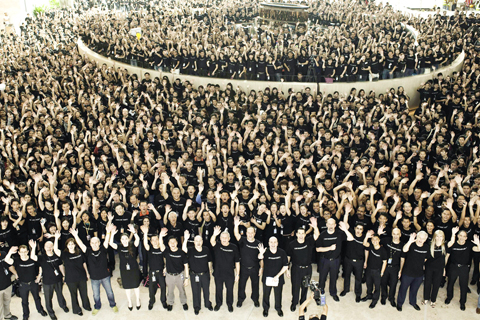Singapore threw open the doors of its second casino yesterday, giving a fresh boost to the city’s tourism sector and raising its profile as a playground for the world’s high-rollers.
The US$5.5 billion Marina Bay Sands, built by US gaming giant Las Vegas Sands, opened at the locally auspicious time of 3:18pm. The number eight sounds like the word for prosperity in Chinese.
It is Las Vegas Sands’ latest big-time bet on the future of Asia’s gaming industry and is its first casino in Asia outside Macau.

PHOTO: AFP
Las Vegas Sands chairman Sheldon Adelson said he expected to recoup his Singapore investment in five years.
“Most of the high-end players are reputable businesspeople. They have to travel anyway so they typically would travel to the major cities, like Hong Kong and Singapore, wherein they do business,” he told reporters.
Singapore gave the green light for casino gambling in 2005, setting off a flurry of construction that went ahead despite the city-state slipping into recession in 2008 because of the global financial crisis.
Its first casino, the US$4.4 billion Resorts World Sentosa built by Malaysia’s Genting Group, opened for business on Feb. 14.
Marina Bay Sands was originally set to open at the end of last year, but faced repeated delays caused by a number of factors, including material and labor shortages and financial problems because of the downturn.
The opening includes the casino and 963 out of 2,560 hotel rooms, a portion of the shopping mall, some restaurants, an exhibition center and the events plaza.
The remaining hotel rooms and suites, a skypark and more shops will open on June 23, while a museum, theaters and other stores will start operations later in the year, the management said.
Officials hope the casinos will help Singapore achieve a target of attracting 17 million visitors a year generating over US$21 billion by 2015, supporting the services sector and reducing the role of manufacturing in the economy.
“This second casino is another boost to the economy, which has been doing much better,” economist David Cohen at research house Action Economics said.
“It should support tourist arrivals, and the retail sector should benefit from that especially now in the midst of the improving global outlook,” he said.
Singapore’s economy surged 13.1 percent in the first quarter from a year ago, prompting the government to sharply upgrade its growth projection this year to 7 percent to 9 percent from 4.5 percent to 6.5 percent.

MORE VISITORS: The Tourism Administration said that it is seeing positive prospects in its efforts to expand the tourism market in North America and Europe Taiwan has been ranked as the cheapest place in the world to travel to this year, based on a list recommended by NerdWallet. The San Francisco-based personal finance company said that Taiwan topped the list of 16 nations it chose for budget travelers because US tourists do not need visas and travelers can easily have a good meal for less than US$10. A bus ride in Taipei costs just under US$0.50, while subway rides start at US$0.60, the firm said, adding that public transportation in Taiwan is easy to navigate. The firm also called Taiwan a “food lover’s paradise,” citing inexpensive breakfast stalls

TRADE: A mandatory declaration of origin for manufactured goods bound for the US is to take effect on May 7 to block China from exploiting Taiwan’s trade channels All products manufactured in Taiwan and exported to the US must include a signed declaration of origin starting on May 7, the Bureau of Foreign Trade announced yesterday. US President Donald Trump on April 2 imposed a 32 percent tariff on imports from Taiwan, but one week later announced a 90-day pause on its implementation. However, a universal 10 percent tariff was immediately applied to most imports from around the world. On April 12, the Trump administration further exempted computers, smartphones and semiconductors from the new tariffs. In response, President William Lai’s (賴清德) administration has introduced a series of countermeasures to support affected

CROSS-STRAIT: The vast majority of Taiwanese support maintaining the ‘status quo,’ while concern is rising about Beijing’s influence operations More than eight out of 10 Taiwanese reject Beijing’s “one country, two systems” framework for cross-strait relations, according to a survey released by the Mainland Affairs Council (MAC) on Thursday. The MAC’s latest quarterly survey found that 84.4 percent of respondents opposed Beijing’s “one country, two systems” formula for handling cross-strait relations — a figure consistent with past polling. Over the past three years, opposition to the framework has remained high, ranging from a low of 83.6 percent in April 2023 to a peak of 89.6 percent in April last year. In the most recent poll, 82.5 percent also rejected China’s

PLUGGING HOLES: The amendments would bring the legislation in line with systems found in other countries such as Japan and the US, Legislator Chen Kuan-ting said Democratic Progressive Party (DPP) Legislator Chen Kuan-ting (陳冠廷) has proposed amending national security legislation amid a spate of espionage cases. Potential gaps in security vetting procedures for personnel with access to sensitive information prompted him to propose the amendments, which would introduce changes to Article 14 of the Classified National Security Information Protection Act (國家機密保護法), Chen said yesterday. The proposal, which aims to enhance interagency vetting procedures and reduce the risk of classified information leaks, would establish a comprehensive security clearance system in Taiwan, he said. The amendment would require character and loyalty checks for civil servants and intelligence personnel prior to